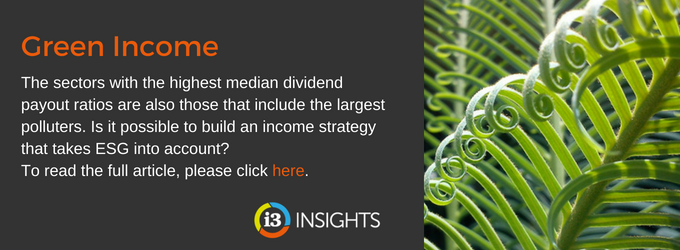CAER Chief Executive Officer Julia Leske speaks with [i3] Insights about the changes she has seen in attitudes towards ESG issues over the 10 years she has been with the ESG research firm.
Millennials are often accused of a whole range of attitudes, from being lazy to being outright delusional about their expectations of life.
But one thing you’d have to give them is that they seem to care more about the society and environment they live in than their parents do.
For example, Nuveen, a United States-based asset manager owned by TIAA, published a responsible investment report at the end of last year that showed 92 per cent of millennials agreed with the statement: “I care more about having a positive impact on society than doing well financially,” compared with only 52 per cent of non-millennials.
Does this mean the future of asset management is brightly green?
Julia Leske, Chief Executive Officer of responsible investment research firm CAER, is quick to point out that although the answer is promising for the future of responsible investing, it is in fact the question that shows how ingrained old attitudes towards environmental, social and corporate governance (ESG) issues still are.

It is too easy to make the argument that you are restricting your investment universe, so clearly you can’t invest in all of the top companies. And yes, diversification in a responsible option is a challenge, but it is not impossible
“Asking that question [whether you agree with the statement] is implying that you forego investment returns if you invest according to your values. You are alluding there to one of the biggest myths in responsible investing and that is that the outcomes won’t be as good,” Leske says in an interview with [i3] Insights.
“It is too easy to make the argument that you are restricting your investment universe, so clearly you can’t invest in all of the top companies. And yes, diversification in a responsible option is a challenge, but it is not impossible.
“Anyone asking this question should go to the RIAA (Responsible Investment Association Australasia) website and read up on 10 years of benchmark reports and track what the results actually mean. So I think the premise of the questions should be a little bit different.”
ESG as a Road to Outperformance
But attitudes to responsible investing have certainly changed for the better in recent years. Leske joined CAER over a decade ago, initially as an ESG analyst, climbing to the very top of the organisation.
And while responsible investing was still a niche activity around the time of the financial crisis, there certainly has been a shift in thinking about these issues, with ESG considerations now being part of most boardroom dialogues.
And as the evidence is mounting that responsible investment strategies do not detract from returns, some initiatives even go a step further and are testing whether an ESG screen can add to returns.
Both asset management behemoth BlackRock and France-based quant firm CFM are conducting research into the idea that ESG could be a broad and sustainable factor that leads to outperformance.
The jury is still out on whether it holds up as a stand-alone factor, or whether it is a variation of the quality factor, but Leske says it makes intuitive sense that strategies that take into account prevailing societal values lead to better results in the long term.

Strong values-based investments will always reflect values that are found within the broader society in which the funds are based
“Strong values-based investments will always reflect values that are found within the broader society in which the funds are based,” she says.
“These societies will put pressure in one way or another onto governments or companies to move on these issues. So in the longer term, it is a factor that will impact the way in which companies operate.
“If you look at Coca-Cola at the moment, they have to majorly revamp their business model and have to change the brand and what they are known for. And that is due to changing public attitudes towards obesity or fat and sugars in our diet.
“In that aspect, there is something there that should be measurable and it is not very easily tangible, because it is not looking at revenues or returns, but intuitively it makes sense that there is an advantage to look for those signals in society, which is something that values-based investors will do.
“A company isn’t something that lives in isolation on a balance sheet; a company operates in the real world and there are other factors in how a company operates.
“When you apply ESG metrics to your investment decision-making, then what you are doing is adding more information to understand better what a company is actually doing and what is happening in a more holistic way to this company.
“So for me it is about investors making use of more information to then lead them to smarter decision-making.”
Climate Change Risk
One of the most pertinent responsible investment questions centres around climate change and what the impact of a two-degree increase in temperature compared to pre-industrial levels, in line with the Paris Agreement, might have on portfolios.
Leske says it is fair that regulators and investors alike single out climate change risk above all other ESG issues.
“I think climate change is very well justified to be singled out because it is one of the major challenges,” she says.
“Climate change will have a very big impact on the economy, both directly and through transformation. If governments, policies and technologies are all moving towards achieving the Paris accord, which we are all aiming for, then the economy has to transform and that will have a big impact on investments.
“If we don’t manage towards a two-degree impact, then there will also be a big impact on the economy, but a chaotic impact. Anyone who is managing investments with more than a two-year horizon will need to back this.”
But one of the obstacles in getting corporates to address climate risk appropriately is that measuring is often confused with managing, she argues.
“A lot of investors seem to think that by measuring their carbon footprint they are managing their climate change risk, so we need to encourage investors to go deeper into analysing what is happening in their portfolios from a climate change perspective,” she says.
“This will bring up a lot of other ESG issues at the same time. You then need to have a structured response to [these risks] and not be afraid that your portfolio looks different than what the benchmark looks like.”
__________
[i3] Insights is the official educational bulletin of the Investment Innovation Institute [i3]. It covers major trends and innovations in institutional investing, providing independent and thought-provoking content about pension funds, insurance companies and sovereign wealth funds across the globe.



